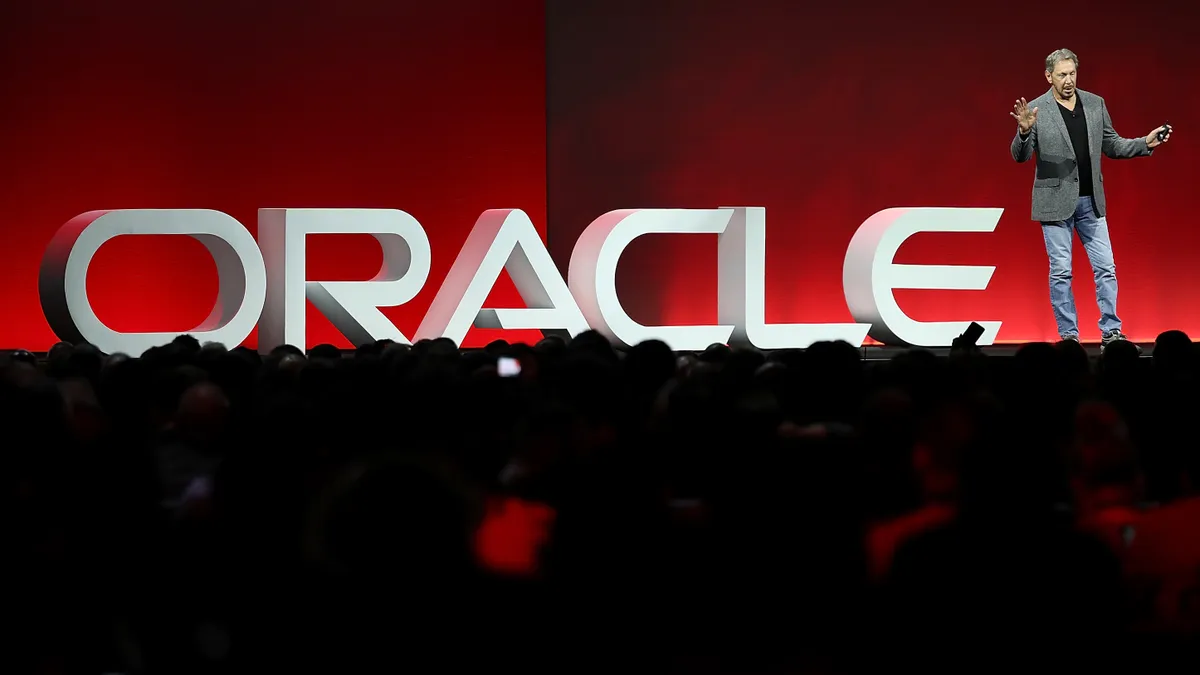Dive Brief:
- Oracle announced AI enhancements to several cloud-based services, including its advertising and customer experience vertical for marketing and sales and its electronic health records solution during the Oracle CloudWorld 2023 conference this week.
- The company is banking on industry verticals and expanded AI training and inferencing workload capacity to grow its cloud business. “For your AI models to be relevant they have to be up to date,” Oracle Chairman and CTO Larry Ellison said during the company’s Q1 2024 earnings call last week. “It’s not that you train and then do nothing but inferencing thereafter. Your training and your inferencing sit right next to each other.”
- To bolster its infrastructure, Oracle deployed new Nvidia H100 Tensor Core GPUs, the cloud provider announced Tuesday. OCI Supercluster capabilities, which allow users to scale up GPU usage, will roll out later this year in Oracle Cloud’s Chicago and London regions, the announcement said, with other regions to follow.
Dive Insight:
The announcements link industry-specific SaaS solutions and generative AI capabilities, two pillars of Oracle’s cloud business strategy. AI-fueled enterprise demand for cloud database services represents a third source of anticipated growth, Oracle CEO Safra Catz said during the earnings call, for the period ending Aug. 31.
As organizations assess the viability of generative AI use cases, cloud providers are rapidly deploying enterprise-grade models and integrating the technology into existing services, such as ERP, CRM and data analytics software.
Oracle’s marketing and sales solution infuses its advertising and customer experience platform, which bundles a suite of CRM applications, with an array of generative AI capabilities.
The additions align with prominent CX use cases many companies are exploring, including chatbots, augmented data search and automated customer history summarization. Sales and marketing teams can use the capabilities to help launch and coordinate campaigns, identify potential customers and monitor existing customer accounts automatically, Oracle said.
Optimizing electronic health records is another promising use case.
Microsoft and EHR provider Epic announced a partnership around generative AI implementation in April and delivered a healthcare industry solution last month.
Oracle, which acquired the healthcare IT company Cerner last year, will roll out enhancements to its cloud-based EHR platform over the next year, deploying AI-powered document recognition, computer vision and voice services capabilities. In addition, the company plans to release an API before the end of this year that will let developers test AI customizations in public sandboxes.
Later this year, Oracle will also deploy Nvidia L40S GPUs, a less expensive alternative to H100 and A100 chips, designed for small and midsize AI workloads.
“We're pretty confident that we've got a cost-performance advantage,” Ellison said last week. “If you run twice as fast in the cloud, you cost half as much because you pay by the hour. So, the performance advantage is really an enormous cost advantage.”












